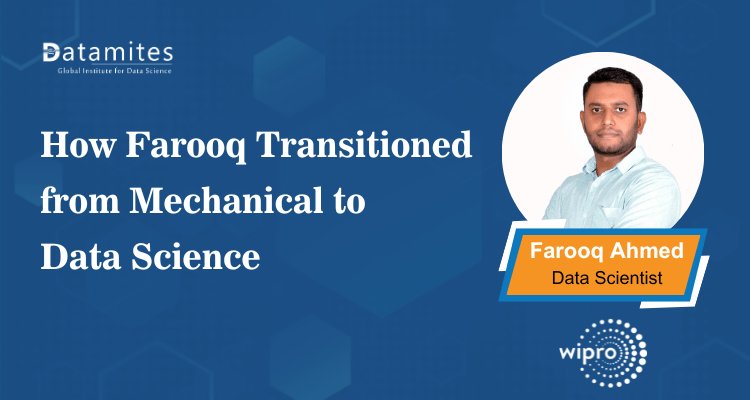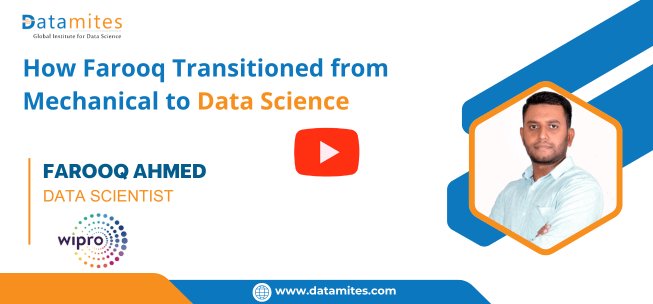How Farooq Transitioned from Mechanical to Data Science
Farooq successfully transitioned from mechanical engineering to data science by leveraging online courses, hands-on projects, and consistent skill-building. His journey highlights the power of perseverance and continuous learning in career shifts.

In today’s fast-paced tech landscape, Data Science has become one of the most sought-after career paths — blending logic, statistics, AI, and programming to solve real-world problems. But can someone from a non-technical background break into this domain? What skills truly matter, and how do you stand out to recruiters?
We share the inspiring journey of Farooq Ahmed, a Mechanical Engineer who successfully transitioned into Data Science — one of the best IT courses for building a future-proof tech career. Today, Farooq works with leading global companies, proving how determination and the right skills can open doors in this booming field. His story offers valuable insights into essential skills, real-world projects, and career strategies.
If you’re an aspiring data scientist, especially from a non-coding background, Farooq’s experience provides the motivation and practical guidance to kick-start your journey.
Farooq’s Data Science Journey: Charting Success with DataMites Institute
Discover how Farooq transformed his passion for data into a successful career with DataMites Institute.
Q1: Can you tell us a bit about your background and journey into Data Science?
I have five years of experience in Data Science, Machine Learning, and NLP. I graduated as a Mechanical Engineer from Visvesvaraya Technological University. During the COVID-19 pandemic in 2020, I decided to transition into Data Science by enrolling in the Certified Data Scientist Course from DataMites. That decision led me to work with companies like HP, and now, I am working as a Data Scientist at Wipro.
Q2: What inspired you to shift from Mechanical Engineering to Data Science?
Coming from a Mechanical background, I wasn't a hardcore developer initially. I was looking for a field that combined logic, statistics, and less intensive coding. Data Science provided that balance, especially with its focus on Machine Learning, statistics, and visualization. Also, AI and Data Science were booming, so it was the right time to make the switch.
Q3: How did your roles and responsibilities vary across different organizations?
The role depends heavily on client requirements. In previous companies, I worked on developing chatbots based on business needs using frameworks like Rasa and SapcA. At Wipro, the focus is on building end-to-end AI applications — right from the user interface to delivering responses — incorporating ML and Gen AI solutions.
Q4: What have been some of the most exciting projects you've worked on?
One of my most exciting projects was building chatbots using Google bot. We also implemented custom solutions with Rasa NLU technology and even experimented with building our own functions to meet specific client needs. Currently, I am involved in developing complete end-to-end applications, and we are migrating many solutions to Generative AI-based systems.
Q5: How do you keep up with the rapidly evolving Data Science landscape?
Continuous learning is essential. When I started, I mainly knew Machine Learning. As the industry evolved, I had to learn NLP, Deep Learning, and now Generative AI. You must understand new architectures and how to apply them to real-world problems to stay relevant.
Q6: What are the essential tools or skills you recommend for aspiring AI professionals?
First, start with the basics — Machine Learning, Statistics, and Python programming. From there, I recommend diving into NLP, exploring techniques like text preprocessing, and understanding models such as LSTM, Bi-LSTM, Transformers, BERT, and GPT. Today, knowledge of Generative AI is crucial, but a solid foundation is non-negotiable.
Q7: How do you see the role of AI evolving over the next 5 to 10 years?
We can expect significant advancements. Look at how ChatGPT revolutionized the AI space — no one imagined its growth two years ago. Similarly, more disruptive tools will emerge. However, I caution students not to jump straight into Gen AI. Start with Machine Learning and understand core concepts because interviewers still ask about traditional models.
Q8: What advice would you give to students aspiring to become Data Scientists?
Don’t skip the basics. Understand the mathematics, Machine Learning principles, and how models work before exploring Generative AI. Many candidates focus only on the latest trends and fail basic technical rounds. Building a strong foundation in the fundamentals will distinguish you from the rest.
Q9: How important is networking for career growth in Data Science?
Networking plays a crucial role. Through strong professional networks, candidates often get referrals for roles in big tech companies. Recently, I’ve seen people with solid ML and NLP skills land great jobs through networking. Your network can open doors that even your resume might not.
Q10: From your experience interviewing candidates, what makes a resume stand out?
Keep it crisp and clear— one to two pages maximum. Avoid irrelevant content like school achievements. Focus on real projects, skills, certifications, and hands-on experience. The format should be clean and presentable. Also, interviewers often focus on basic technical questions, so candidates should prepare accordingly.
Q11: What level of Python is expected — beginner, intermediate, or expert?
As a Data Scientist, you should have optimum coding skills. You don’t need to be a senior Python developer, but you should know how to write, debug, and understand functions or classes. Reading existing code and making changes is part of the job — development-level familiarity is essential.
Q12: Which books or resources helped you the most?
I highly recommend O'Reilly Publications — their content is reliable and clear. I’m currently learning about LLM production systems, which are becoming crucial. I’ve also used Springer Publications and follow tech blogs — many explain complex concepts simply, even for beginners.
Q13: How do I build a project portfolio that stands out?
Work on ML or NLP projects — especially Chatbots, which combine practical AI with real-world use. But here’s the thing: It’s not about fancy projects; it’s about how well you understand them. You must be able to clearly explain your project — what it does, how it works, and your contribution.
Q14: What if I don’t know the answer during interviews?
Be honest. If you don’t have experience with a particular tool or technology, be honest and say so. But for areas you know, explain confidently and clearly. Interviews are not just technical — your ability to communicate matters.
Q15: What mistakes did you make early in your career?
I focused too much on advanced topics like Topic Modeling but neglected the basics. In interviews, I struggled to answer simple questions like:
- What are Stop Words?
- What is Lemmatization?
- Why is Tokenization important?
Don’t skip the basics. Build your knowledge from the ground up — it makes all the difference.
Refer these articles:
- How Rauful Azam Transformed His Career with Data Science
- Cracking into Data Science: Kowshik’s Inspiring Journey
- Breaking Into Data Science: Ankita’s Story of Success
Insights from Farooq's Path to Data Science Mastery
Discover the pivotal lessons, bold moves, and hidden struggles that shaped Farooq’s remarkable journey into the world of data science.
- Non-technical backgrounds are welcome — anyone can transition into Data Science with proper learning.
- Data Science blends logic, statistics, and coding — ideal for those not from hardcore development backgrounds.
- Start with strong fundamentals — focus on Python, Machine Learning, and Statistics before advanced topics.
- Real-world, hands-on projects like Chatbots or AI applications strengthen your portfolio.
- Be ready to build end-to-end AI solutions, especially with the rise of Generative AI.
- Stay updated with evolving trends — Continuous learning is essential to stay relevant in the industry.
- Python knowledge should be at an optimum level — writing, debugging, and understanding code is a must.
- Networking significantly boosts job opportunities through referrals and connections.
- Keep resumes crisp and focused — highlight relevant skills, certifications, and project experience.
- Use reliable resources — O'Reilly, Springer Publications, and tech blogs simplify complex concepts.
- Don’t neglect basics — understanding simple NLP and ML concepts is crucial for interview success.
- Be honest during interviews — admit if you don’t know something but confidently explain what you do know.
- Master the core concepts before diving into Generative AI — solid foundations lead to long-term success.
Refer these articles:
Farooq’s journey proves that with dedication, smart preparation, and continuous learning, anyone can succeed in data science. Watch DataMites Success Stories to see how people from diverse backgrounds are transforming their careers through expert-led training and practical exposure. At DataMites, we’re proud to be part of Farooq’s success and look forward to inspiring more such journeys from our growing community.
If you’re planning to follow in Farooq Ahmed’s footsteps and step into the world of data science, now is the ideal time to upskill. According to the IMARC Group, the global data science platform market is expected to surge from USD 15.2 billion in 2024 to USD 144.9 billion by 2033, growing at a CAGR of 27.08%. With industries generating massive amounts of digital data, skilled data professionals are in high demand. Choosing the right training institute that offers practical learning, project exposure, and placement support is key to success. Joining a recognized data science training in Bangalore, Hyderabad, Chennai, Mumbai, or Delhi can be your pathway to a growing career in tech.
DataMites Institute played a crucial role in Farooq’s career shift by providing industry-recognized training in Data Science, AI, ML, Python, and Data Analytics. Backed by IABAC and NASSCOM FutureSkills accreditation, DataMites equips learners with expert guidance, real-world project experience, and job assistance to help them transition into tech careers.
With data science courses in Pune, Bangalore, Hyderabad, Chennai, Ahmedabad, Coimbatore, and Mumbai, along with flexible online learning options, DataMites makes data science education accessible for freshers, professionals, and career changers alike — just like it did for Farooq.

